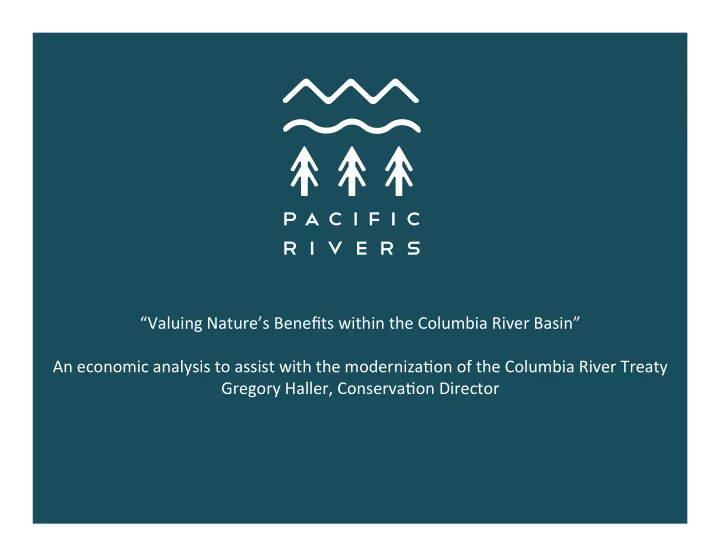

“Valuing Nature’s Benefits within the Columbia River Basin” An economic analysis to assist with the moderniza@on of the Columbia River Treaty Gregory Haller, Conserva@on Director
1948 Flood in Vanport, Oregon
Flooding at Vanport
1948 Bonners Ferry Flooding
1964 U.S.-Canada Columbia River Treaty • Flooding in the U.S spurred Treaty nego@a@ons • Signed in 1961, implemented in 1964 • Resulted in three new dams in Canada and one in the United States • Two purposes: coordinated flood risk management and hydropower genera@on • Power sharing commitment (“Canadian En@tlement”)
1964 U.S.-Canada Columbia River Treaty
Hydrograph at The Dalles
Columbia River Treaty • No end date, but the Treaty can be terminated with ten years no@ce by either side. • 2024 – Coordinated flood control ends, requiring the U.S. to use all effec@ve storage space in U.S. reservoirs before it can call upon Canada to store water in the event of a flood. – Poten@al to disrupt ecosystem and other opera@ons that benefit other water users/uses • 2013 Regional Recommenda@on includes adding “ecosystem-based func@on” as a 3 rd purpose of the Treaty • U.S., Canada, Tribes and stakeholders gearing up for nego@a@ons
Context and Need For Environmental Economic Analysis • Support the inclusion of “ecosystem-based func@on” as a third purpose of the Treaty • Counter the arguments made by u@li@es and others that say: – “The region can’t afford to do more for salmon” • We’ve spent $12 billion salmon recovery since 1992 – “Salmon runs are doing just fine” – “Primary Objec@ve of Treaty nego@a@ons should be to rebalance the Canadian En@tlement” • $250 million power to the Canada every year
Study Purpose Define the economic, ecological, cultural and social benefits that the ecosystems of the Columbia River Basin provide, and the impact of investments in the conserva@on of these natural assets, including fisheries, water quality, flood risk reduc@on and electrical power, will have on the region’s economic and social well-being.
Study Sponsors • Upper Columbia United Tribes • Columbia River Intertribal Fish Commission • Pacific Rivers • WaterWatch of Oregon • Save Our Wild Salmon
Scope of Study • Columbia River Basin (U.S. and Canadian por@ons) • Will compare con@nued development trends vs. a natural resource alterna@ve scenario, that will consider investments and changes to hydropower opera@ons, the restora@on of floodplains and other habitats that generate ecological and economic dividends.
What will the Study assess?
Recrea@onal Fishing
Resident fisheries
Tribal & Non-Indian Commercial Fisheries
Lamprey
Irriga@on
Naviga@on
Renewable Energy Development
Thank you!
Recommend
More recommend